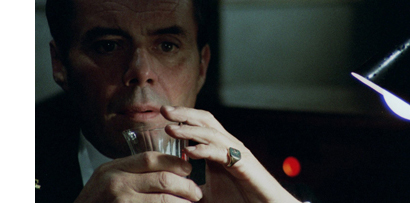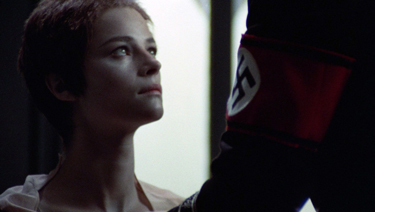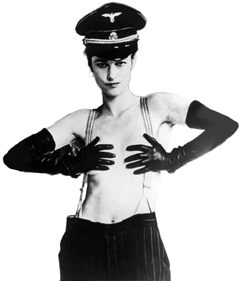
 |
|
|
|
Liliana Cavani's The Night Porter (Il portiere di notte, 1974) picked up a reputation as a grim, kinky sex film. It didn't kick off the "Nazista" exploitation film craze but was accepted as the high end of that subgenre, along with Lina Wertmüller's Pasquelino Settebelletze. The story of a sick love relationship is also an insightful examination of Nazi psychology; it's an interesting thematic extension of Luchino Visconti's La caduta degli dei (The Damned), which also stressed the connection between fascism and sexual aberration. Criterion's added value extras contain analysis that makes a good case for its legitimacy. 
The Night Porter has some strong scenes but mostly disturbs with unpleasant ideas. In late 1950s Vienna, hotel desk clerk/porter Max provides illicit services to some of the hotel's clients, including acting as a gigolo for the elderly, corrupt Countess Stein (golden-era actress Isa Miranda), and helping dancer Bert (Amadeo Amodio) stage private ballet dances. During the war Max served in the SS as a fake doctor in a concentration camp, amusing himself with bizarre 'experiments' and doing photographic studies of the helpless prisoners. He's being 'investigated' by his SS cohorts Klaus and Hans (Philippe Leroy & Gabriele Ferzetti), whose secret '' organization makes its members more secure from possible prosecution for war crimes, by destroying records and occasionally 'filing away' a witness. Few of any of Max's concentration camp victims are alive to accuse him, but a restaurateur named Mario (Ugo Cardea) reportedly knows of one. Max is suddenly de-stabilized by the appearance in the hotel of Lucia (Charlotte Rampling); she's shocked to see him as well. Lucia survived Max's Lager because she became his lover, submitting willingly to his commands. Instead of informing on Max, Lucia allows their sado-masochistic relationship to re-commence. When her husband (Marino Mase) leaves her behind for a couple of days, Lucia succumbs to amour fou and moves into Max's rooms to stay. But the SS group won't countenance the existence of a witness, and when Max refuses to give her up their future looks very dark. 
Ten years later The Night Porter would be labeled "not P.C." but in 1974 many mainstream reviewers wouldn't touch such a 'sick story about sick people, in terrible taste'. That's the problem with most anything related to the Holocaust that doesn't take the wide, dull view of ultimate horror. An honest look at Nazi atrocities can easily be as offensive as intentional torture porn. Pasquelino Settebelleze showed the degradation an Italian man endured to survive a camp that wasn't even an extermination camp, per se. As awful as it is, Pier Paulo Pasolini's Salò has a claim to relevancy as well: the Fascist Will to Power is form of sex perversion. The Night Porter uses brief flashbacks to show that the outwardly fastidious, civilized Max was and still is a licentious monster. With absolute control over his 'charges' in the camps -- the SS has seemingly allowed him to play doctor for his own amusement -- Max is first seen photographing Lucia when she arrives, as she stands in a group of naked prisoners. He torments her by shooting a gun in her direction, just to prove his power over her. No communication is necessary. Max soon singles Lucia out as a sex partner, and she becomes 'the great love' of his life. 
The squeamish angle is that Lucia is seen responding to Max's revolting power play, and soon becoming an avid participant. Does she have an inclination for this, or it a survival reflex? When they meet so many years later Lucia at first seems shocked into silence by fear of her captor -- until she responds positively to his brutish advances. She apparently was never happier than when she was raped by a man who treated her as a petty possession, in a horrifying sex game. Without resorting to dialogue explanations, The Night Porter makes this relationship seem credible. The flashbacks further show the sexual deviancy of the SS officers, who live out the fantasy of a death cult in fetishistic uniforms and insignia while exerting total power over their helpless victims. The officers watch Bert, one of their own, performs an erotic ballet wearing almost nothing; another extended flashback shows a topless Lucia singing and dancing for the SS in decadent '20s style. The image of actress Rampling (who at the time seemed up for anything involving nudity) vamping in the kinky outfit became a sure-fire advertising image. Yet The Night Porter is a film of legit ideas.
Max and Lucia's twisted sex relationship is not condemned in itself, which of course puts The Night Porter out of bounds for the narrow minds that can't accept a film like Almodóvar's Atame!, because it suggests that (omigosh!) a couple might establish a satisfying relationship by politically incorrect means. But disc essayist Gaetana Marrone nails the romantic
Just when we're thinking that director & co-screenwriter Cavani is making some kind of sympathy case for these crazy lovers, Dirk Bogarde's Max is revealed to be even more loathsome. He murders a man in a pointless effort to obstruct his colleagues' investigation. After Celia dances for him and the other SS officers, Max presents her with a horrendous gift that he sees as having 'Biblical' resonance, from the story of Salomé. Several of the residents and even one of Max's co-workers at the hotel are associated with the SS past. The incestuous little group is united in self-protection, eager to commit murder to protect Max, but just as willing to snuff him out if he proves 'unstable'. Max and Lucia aren't sympathetic lovers like Bonnie & Clyde, Romeo & Juliet or Sixten Sparre & Elvira Madigan. But they go out proudly waving their freak flag.
Ms. Cavani must have been inspired by her subject matter and her excellent cast, for The Night Porter is an excellently written and directed show. The flashbacks arrive just when they're needed and don't wear out their welcome. A murder that any normal exploitation film would emphasize, instead takes place quietly off screen. The dominant sex is mostly implied (this is another of Pauline Kael's 'zipless' pictures) yet we're clued into specific bedroom
Whether cowering in hiding or skulking about plotting a Fourth Reich, surviving Nazis in most fiction films are tasteless inventions to serve some kind of exploitative agenda. Cavani's SS diehards are a realistic pack of lizards that might 'Heil' old times in private but are mostly concerned with self-preservation, and the ability to hide in plain sight. Handsome Phillipe Leroy (55 Days at Peking) has the scars and a monocle of a conventionally nasty character, but Gabrielle Ferzetti's calm lawyer and Amadeo Amodio's homosexual recluse are not as easy to pigeonhole. Isa Miranda's fat old grand dame and Ugo Cardea's chef seem to be fellow travelers of the SS cell, while a younger operative divides his time between executions and gigolo duty. Nobody in The Night Porter seems a typical genre character. Criterion's Blu-ray of The Night Porter bests earlier discs, including a release from the company's early years. Interiors are warm but not inviting, while the Austrian exteriors seem bathed in cold hues. The heightened resolution reveals the fine granularity of most shots and the wide screen framing shows off Cavani's excellent compositions and camera moves. Some shots have a shallow focus, which we are told may be Cavani's attempt to stay literally on Max's visual plane -- he's a functioning sociopath, self-trained to be invisible and always isolated from the world around him. The audio track is in English with no language choices, which is presumably the official language -- other actors are dubbed but Bogarde and Rampling use their own voices. Disc producer Kate Elmore's choices for extras seal the deal for The Night Porter as an honorable achievement and Liliana Cavani as a bona fide quality filmmaker. She's candid and forthcoming in a new video interview. We're especially impressed by her La donna nella Resistenza (Women of the Resistance) (1965), a no-frills but riveting interview docu in which a half-dozen diverse Italian women tell of their harrowing experiences in WW2, fighting German Nazis and Fascist Italians, suffering tortures and witnessing brutal cruelties. They're the real deal and a fascinating set of personalities. Cavani biographer-analyst Gaetana Marrone provides the feature essay on Criterion's folding insert liner, and a 1975 interview with Cavani is included as well. The Night Porter prompts a re-viewing of Cavani's 1969 dystopian sci-fi drama I cannibali, which, now that I think of it, also conveyed its criticism of a dictatorship through sex -- rebels first express their alienation through sex, while one man caught in a dilemma of identity reverts to dog-like behavior, dropping out of the whole civilized-behavior game, so to speak. I cannibali is nowhere near as successful as is The Night Porter, but its 'thesis' is consistent.
On a scale of Excellent, Good, Fair, and Poor,
The Night Porter Blu-ray

The version of this review on the Savant main site has additional images, footnotes and credits information, and may be updated and annotated with reader input and graphics.
Review Staff | About DVD Talk | Newsletter Subscribe | Join DVD Talk Forum |
| ||||||||||||||||||